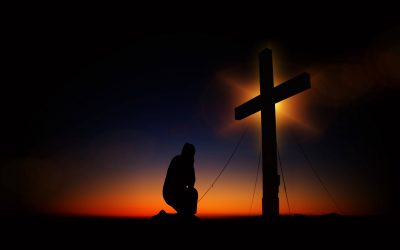As we go along through life, many of us struggle for our independence. We want to be an individual. We want to be unique, able to stand alone. When we walk in forgiveness, we are able to do that. We can make our own decisions, do what we want to do, and be what we want to be. When we walk in unforgiveness, our life is determined by others. We are no longer able to do certain things, to go to the places we want to go, or to have the relationships that we truly need.
When Carol, Barb, and Rich were growing up, they were typical brother and sisters. They had their times of joy and their times of disagreement. Their father died when they were in their teen years. Rich, being the oldest, began to help support the family and shoulder the responsibility. While finishing high school, Barb and Carol helped keep the house clean and meals on the table while Mom went off to work. All went well, considering the challenges they faced. One day after Carol, the youngest, graduated, they were all at home for a family dinner. Before they knew it, they were in the middle of a family argument. Carol felt that it was all her fault because the argument was started by her. How could she do this to her family? How could they ever forgive her? That night Carol left home, the people whom she loved and needed, those who had always stood by her were no longer part of her life. Carol had severed her family ties and made herself a part of a lonely world where people did not care about her and didn’t recognize her value. At Christmas time she was not with her family. On her mother’s birthday she could not give Mom a card or present. There were no more of those wonderful lunches with her sister, no more opportunities with her older brother to get the advice she needed. Carol was no longer free to make her own choices, no longer free to do what she wanted to do or to go where she wanted to go. She could not pick up the phone and tell her mom she loved her—all because of unforgiveness. In this case, she would not forgive herself, and now she locked her‑ self in prison because of it. Fifteen years later Carol was reunited with Barb and Rich. She discovered that they had never been mad at her. It was all a big misunderstanding. Barb and Rich had searched diligently to find her over the years. They longed to have her be a part of their life, but Carol was nowhere to be found. One of the most unfortunate parts is that Carol’s mother passed away two years before their reunion. Carol wept deeply when she found out about her mother. She had missed so much, so many very important events, all because she was locked in prison, a prison she had built herself. She was the warden, the cell guard, and the parole commission. She remained in that prison, unable to do what she wanted to do until she humbled herself, returned to her family, and accepted their forgiveness.
So many of us have a similar story. We have locked ourselves into a prison because of unforgiveness. We are no longer free. We are unable to freely go to the places we used to enjoy. Another group of prisoners bound by their unforgiveness thinks that their bars are good for them, that the bars protect them from the dark, cruel world. They believe they will not be hurt again if they just stay behind the bars. This is a great theory, but it cannot work. Our freedom is stripped from us. The same bars that protect us from being hurt keep us from being healed. The hurt put us into prison, and only love will set us free and make us whole.
Midge was a woman full of life, a loving wife and an active mom involved with her children. Her husband, Ted, was in the insurance business. As the years went by, the business grew, and he was able to provide a comfortable living for his family. As has happened all too often, Ted got involved with his secretary at work. The relationship progressed for some time, then Midge found out. She was devastated. Her world had fallen apart. She could not find it in her heart to forgive her husband or the other woman. (Now we can all agree that this was devastating news, that this would crush even the best of us. What would we do? How would we react? Could we survive?) As you can imagine, Midge’s life was devastated. She became very bitter and refused to forgive her husband or the other woman. Midge placed herself in solitary confinement. Deep in the bowels of prison, she could no longer be a mom to her kids. Her bitterness kept her from loving her kids, from being there when they needed her. Her friends lost her. There were no more times of coffee and chatting, no more lunches or trips to the mall, and no more talks about how to raise kids. She ended up moving back in with her mom. Because of the deep confinement of her prison caused by her unforgiveness, she was unable to celebrate Christmas, sing a birthday song, or enjoy a Thanksgiving dinner.
The truth is that this would be a difficult situation for anyone to be in. Midge ended up with cancer racing through her body. It is true that many people suffered loss as a result of Midge’s imprisonment. It was, however, Midge who suffered the greatest loss. She lost everything that she held dear. She was never able to love again as a result of her unforgiveness. Her husband was gone, and I suppose we can understand that. She also lost her kids, her friends, her mom, and her life. She died of cancer. As she lay there in that bed at 68 pounds, unable to speak, she asked for a writing board. Before her last dying breath, she wrote a derogatory remark about her ex‑husband. What a miserable way to live. What a miserable way to die. There is no excuse for Ted’s action. He was one hundred percent wrong. But being wronged does not give us the right to judge others and destroy our lives.
The very best way to get even is to receive the grace, rise above the situation, and forgive. Then we can be released from prison so that we are free to live life and free to help others. No matter how much we make anyone suffer, we suffer more. No matter what price anyone else pays, the one who does not forgive pays a higher price. Isn’t it true that we all want to be who we really are? We want to succeed and have a life worth enjoying. To be truly free and to stay out of our self‑imposed prison, we must choose to walk in forgiveness. It is a choice, a choice that only we can make. Offenses will come. We are all given many opportunities to take up an offense. Although these offenses come to all, do not take them up! We can say, “But you don’t understand.” The truth is you don’t under‑ stand the cost. We can say, “It’s not our nature or personality to forgive.” But we must choose to change and adjust so that we can avoid our self-made prison. We can say, “You don’t know what they did to me, how deep the hurt is!” Maybe not, but I know that if you don’t forgive, you will put yourself in prison, and many other people whom you deeply love will be hurt as a result of your imprisonment. Their pain will cause you even more pain. You need to choose forgiveness so you are free to be who you really are, to go where you want to go, and to stay out of prison. This is your ticket for parole. The greatest advantage of forgiveness is your freedom.



